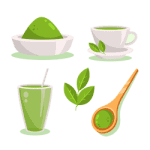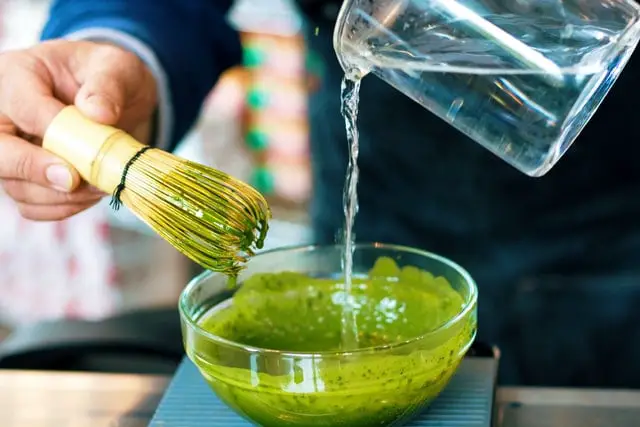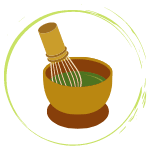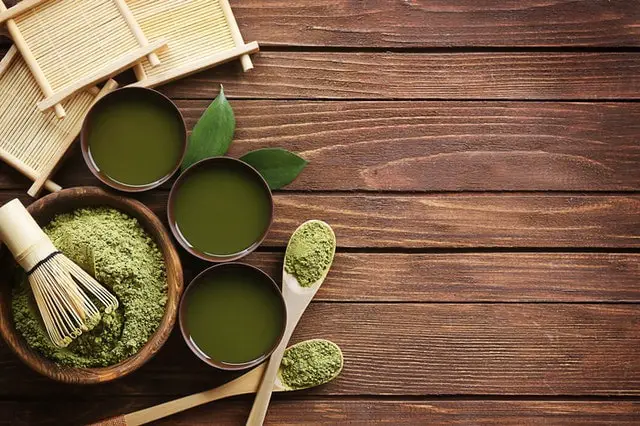
Even though matcha tea hit fever pitch a few years ago, it is still going strong.
And this isn’t just because there are so many ways to enjoy it.
No, matcha is actually quite good for you – in a wide variety of ways.
At the same time, there is a fair amount of hype surrounding this drink.
So, let’s take a real look at the kind of health benefits that it has to offer:
Contents
Before you take a look at the benefits of matcha, you should first understand what makes it so healthy.
Well, this has to do with both how matcha is grown, plucked, and processed.
To begin with, this kind of green tea is grown in the shade.
As a result, it produces a greater amount of chlorophyll.
This creates a bright green color and a higher nutrient content.
Furthermore, with matcha, whole green tea leaves are picked and ground up.
This means that you get the benefit of the entire leaf, not just part of it.
In most instances, matcha appears to have a higher EGCG content than green tea.
EGCG is a catechin that protects the body from a wide number of health issues.

Yes, matcha does contain caffeine.
In fact, at around 70mg per 8 ounces of beverage, matcha has more caffeine than regular green tea.
This is because you consume the whole leaves rather than just the infusion from them.
What many people aren’t aware of is that there are two grades for matcha.
These are the ceremonial grade and culinary grade.
Now, on average, ceremonial grade matcha is grown and sourced more carefully.
Thus, it tends to have a higher quality and be more nutrient-heavy as well.
While it does tend to be more expensive, it is better than the culinary version, unless you are in a pinch.
Now, let’s get down to the main health benefits of matcha:

Among all of its other nutrients, matcha boasts a significant antioxidant content as well.
Now, antioxidants are responsible for preventing free radical damage in the body.
This reduces the risk of oxidative stress and stops cell and tissue damage from occurring.
In turn, matcha can be responsible for the prevention of a large number of medical conditions.

When it comes to cancer, prevention is certainly better than the cure.
Well, this is exactly what matcha may be able to do, particularly with estrogen receptor positive and negative breast cancer cells.
Well, this is exactly what matcha may be able to do, particularly with estrogen receptor positive and negative breast cancer cells.
In one study, researchers were able to prove that breast cancer cells that were incubated with matcha, reduced the viability of the cells.
Thus, drinking matcha on a regular basis may be able to protect you from specific cancers.

Kidney and liver damage can result from a poor lifestyle as well as certain medical conditions.
The good news is that matcha could potentially protect these organs from continued damage.
Lab rats with diabetes were given matcha, resulting in an improved function of the liver.
Based on this, scientists were able to concur that matcha can protect against liver and kidney damage via:

If you are looking for a boost when you need to study, focus, or complete a project, you may want to reach for a cup of matcha.
This is because it has some very interesting performance boosting properties.
As you are probably aware, caffeine is great for kicking your mental performance into high gear.
And, since matcha contains caffeine, it makes sense that it helps when you are trying to get work done.
However, in many instances, caffeine can have a side effect – drink too much and you end up jittery an unable to concentrate.
Well, this is the beauty of matcha – it contains a compound called l-theanine as well.
L-theanine is linked to feelings of relaxation and calmness.
The combined effort of caffeine and l-theanine results in greater alertness as well as to switch between tasks more easily.

If you are on the lookout for a supplement that could help you lose weight, matcha may be the answer.
This is because it enhances fat oxidation.
Thus, your body has an easier time burning fat, particularly when you are exercising.
Drinking a few cups of matcha every day could potentially make your workout routine more effective.

Remember how matcha contains l-theanine, a component that promotes relaxation?
Well, it appears that it is also excellent for reducing stress in people as well.
This means that it could potentially help people to deal with stressful events more effectively.
On a similar note, there is some evidence to show that matcha behaves as an anxiolytic.
This is a component that helps to reduce feelings of anxiety in individuals by activating the dopamine and serotonin systems.
Therefore, it could come in useful for individuals who have mental health conditions that result in anxiety symptoms.
Related Article
Drink Tea and Chill - The Best Teas for Anxiety

Now that you are aware of what matcha can do for you, it is time to learn how to drink it the right way.
Despite being a healthy drink, matcha does contain a fair amount of caffeine.
Drink too much and you could end up jittery or even compromise your sleep quality.
This is especially true for people with caffeine sensitivities.
Each serving of a matcha drink should contain about 1 teaspoon of matcha.
So, try to limit yourself to just one to two cups a day.
And, make sure to avoid drinking matcha past the afternoon hours.
This way, you reduce the risk of it disrupting your sleep.
By itself, matcha is incredibly low in calories.
However, if you add milk or drink it as a latte, you are automatically increasing the number of calories that you are consuming.
You may also be taking away from some of the health benefits of the drink.
If you add sugar, then you are decreasing the health value of matcha even further, while simultaneously increasing the calorie consumption.
So, it is best to make the drink with just water.
Leave the lattes for special occasions.
So, there it is – everything that you need to know about the health benefits of matcha. As you can see, it packs quite a punch.
If you enjoyed this post, you should head over to our Pinterest page. It contains lots of more information on matcha, green tea, and similar beverages.
